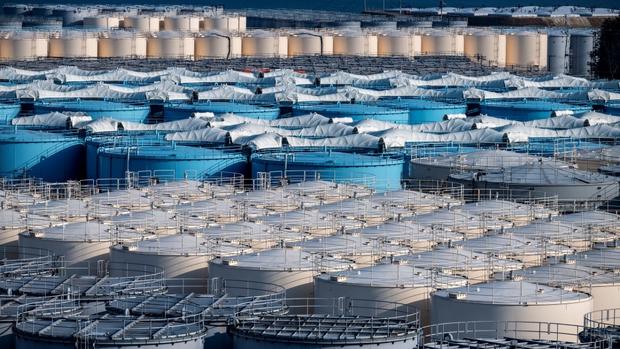 The file photo dated Feb 21, 2021 shows storage tanks for contaminated water at the Tokyo Electric Power Company's (TEPCO) Fukushima Daiichi nuclear power plant which was badly damaged in the 2011 earthquake and tsunami in Okuma, Fukushima prefecture. (PHILIP FONG / AFP)
The file photo dated Feb 21, 2021 shows storage tanks for contaminated water at the Tokyo Electric Power Company's (TEPCO) Fukushima Daiichi nuclear power plant which was badly damaged in the 2011 earthquake and tsunami in Okuma, Fukushima prefecture. (PHILIP FONG / AFP)
Stocks of fishery and environmental protection companies listed in China's A-share market have been moving in opposite directions ever since concerns arose over Japan's decision to release more than 1 million metric tons of contaminated water from the damaged Fukushima nuclear plant into the Pacific Ocean. Fishery-related stocks fell while green-themed shares soared on two consecutive trading days.
A-share listed environmental protection companies reported an average 0.66 percent price increase on Wednesday, following the marginal 0.04 percent average increase on Tuesday.
Shortly after the Japanese government said on Tuesday that it would proceed with plans of discharging radioactive water into the Pacific Ocean, industry leader ChiNext-listed Henan Qingshuiyuan Technology Co Ltd, which offers waste water disposal technology and products, saw its shares rise by the daily limit of 20 percent on Tuesday. Another industry giant Fujian Haixia Environmental Protection Group which trades on the main board at the Shanghai bourse saw its shares rise by the daily limit of 10 percent.
Liu Youhua, research director of Shenzhen Rongzhi Investment Consultant Co, a market research firm, said the surge in agriculture and fishing industry shares was mainly due to short-term speculation. There is no long-term momentum to further push up the prices of publicly-traded agricultural and fishing companies and this is the likely trend that investors should be aware of, he said
The two companies continued to touch the daily price increase barriers on Wednesday.
Other Chinese companies have also responded quickly to Japan's decision. Shenzhen-listed CEC Environmental Protection Co Ltd announced on Tuesday that it has taken a leading position in China, in dealing with waste water from nuclear power plants. The company said it will give full play to its competitive edge in technology for nuclear plants' waste water disposal. Shares in the company's rose 2.86 percent to 7.54 yuan (US$1.15) on Wednesday.
ALSO READ: Study: Contaminants in Fukushima water to cross Pacific Ocean
Membrane technology provider Suntar Environmental Technology Co Ltd, which went public on the STAR Market in November 2019, saw its shares surge 4.01 percent to 16.86 yuan. The company said that its membrane technology has been used in the Qinshan Nuclear Plant in Zhejiang province and the Tianwan Nuclear Plant in Jiangsu province for waste waster disposal.
Though concerns were expressed regarding the possible impact on sea life in China's maritime zone, the country's domestic freshwater fisheries index compiled by market tracker Wind Info rose by 9.26 percent, with eight companies in the sector seeing their share prices surge by the daily limits.
The intraday surge was, however, not reflected in the overall market performance on Wednesday. According to Wind Info, agricultural and fishing companies listed on the A-share market saw their prices fall by an average 2.59 percent, while the benchmark Shanghai Composite Index and the Shenzhen Component Index edged up by 0.6 percent and 1.55 percent.
Liu Youhua, research director of Shenzhen Rongzhi Investment Consultant Co, a market research firm, said the surge in agriculture and fishing industry shares was mainly due to short-term speculation. There is no long-term momentum to further push up the prices of publicly-traded agricultural and fishing companies and this is the likely trend that investors should be aware of, he said.
READ MORE: China seriously concerned about Fukushima water disposal
Zhang Binmei, an analyst from Orient Securities, said in a report that China's fishing industry has turned around since the beginning of this year, as seen in the 8.1 percent year-on-year growth of the fishery product CPI in March. The waning impact of the COVID-19 epidemic and the decline in supplies of fishery products in the previous months are the main reasons for the rising price index, he said.


